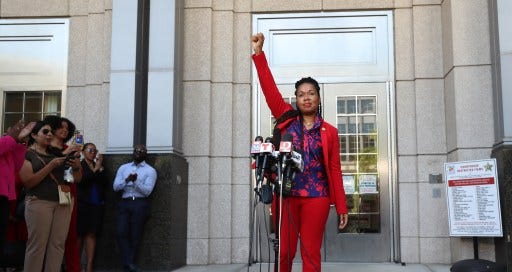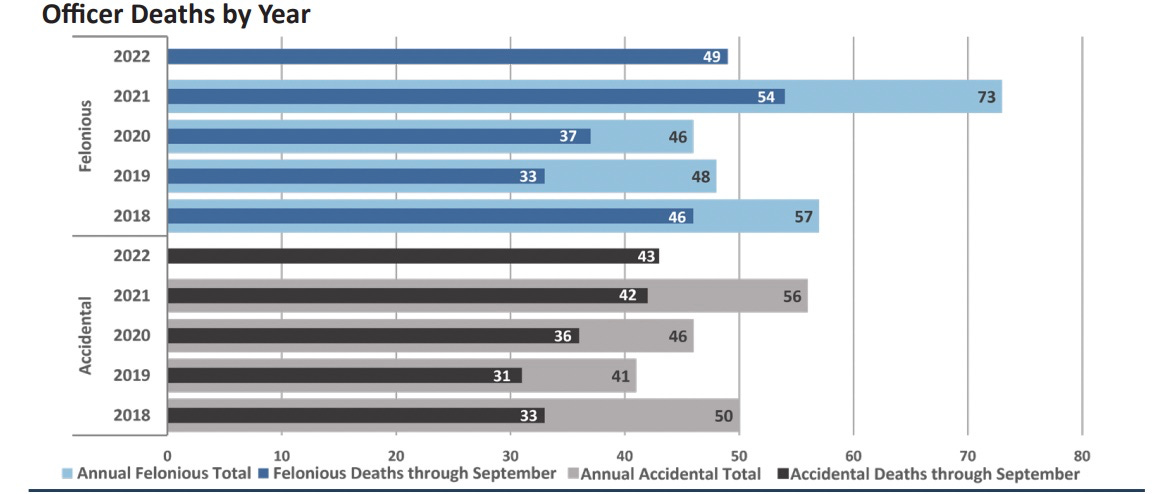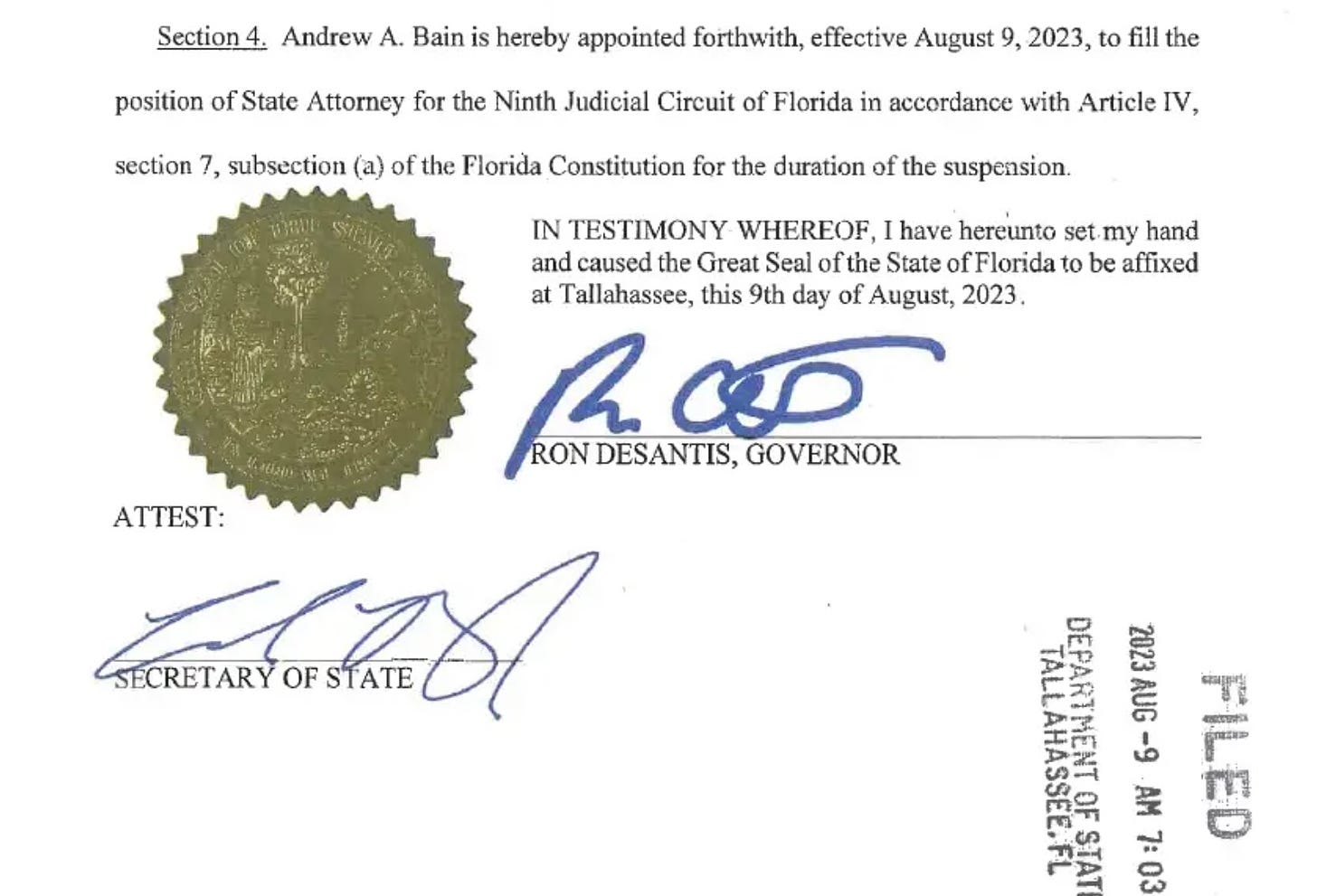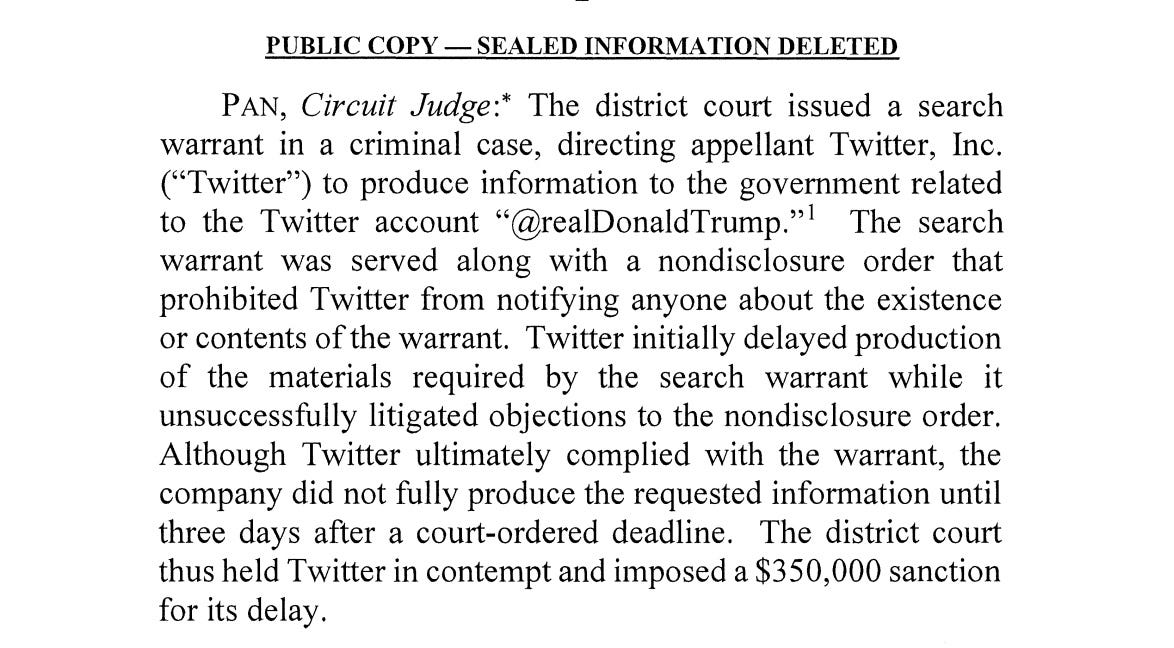Lots of candidates in the mix for the outrage of the day title. Today was a virtual parade of horribles.
Ron DeSantis:
Governor and culture warrior Ron DeSantis suspended Florida State Attorney Monique Worrell, who serves Orange and Osceola counties, from office today. Worrell’s counties have been plagued with high rates of violent crime, as are many parts of our country. DeSantis says it’s her fault and took action against her after the deaths of two Orlando police officers during a traffic stop.
Law enforcement officers are tragically killed in this country every year. But aside from DeSantis, governors rarely if ever even suggest they have the authority to remove an official who was duly elected. No one has suggested that the United States Attorney who has responsibilities for preventing and prosecuting violent crime in those two counties should be removed as well.
DeSantis says the state attorney is responsible for crimes because of her charging decisions and failure to detain violent criminals. She has said her ability to act is cabined by the evidence she has and that when local law enforcement makes arrests before there is sufficient evidence to back them up, prosecutors can’t proceed in good faith. The call on who is right in this argument is up to voters, though, and not up to the governor, who just so happens to belong to a different political party than the state attorney. It’s a raw abuse of authority that further reinforces other evidence that Florida’s governor is a would-be authoritarian, willing to bypass the people’s constitutional authority to elect their own officials.
This is the second time DeSantis has suspended an elected state attorney who is a Democrat. He accused Worrell of “neglect of duty and incompetence.” She told citizens of her two counties, “I am your duly-elected state attorney for the Ninth Judicial Circuit and nothing done by a weak dictator can change that. This is an outrage.”
While DeSantis’s actions are singular, they may not be unique for long. There has been sustained pushback against prosecutors elected in the last decade as criminal justice reformers. That includes SB 92 in Georgia, which passed after Fani Willis’s investigation into Donald Trump became well known. The law permits an eight-member oversight commission appointed by the governor to discipline or remove elected district attorneys.
Twitter:
The Special Counsel subpoenaed Twitter to get access to Donald Trump’s account, raising all sorts of questions about what was in there. DMs to and from Mr. Trump? His drafts? His search terms? If it was to get fully authenticated copies of his tweets to use at trial, there would have been no rationale for preventing disclosure of the search warrant to Trump, which is what prosecutors convinced the court to do.
Why? The judge let prosecutors keep Trump in the dark because prosecutors convinced the court that if Trump learned about the warrant, it would have seriously jeopardized the investigation, which was ongoing at that point, and Trump could have destroyed evidence, let others know, or changed his own behaviors (I’m not sure what this means or what we can infer prosecutors were looking for from it). In other words, prosecutors convinced the court Trump would obstruct justice if he knew about their ongoing investigation.
We learned about this today because Twitter declined to comply with the district court’s order. And lost. Ultimately, Twitter failed to comply with the search warrant on time, and the district judge imposed sanctions, ordering Twitter to pay a penalty. Twitter appealed that decision. Today, with the case indicted and no further need for secrecy (or at least not a total blackout—notice that in the version of the order the court released, it suggests that some information has been redacted), we learn that the court of appeals “affirm[ed] the district court in all respects.”
It turns out the billionaire owners of social media platforms aren’t above the law. Elon Musk found out. The fine of $350,000 for missing the deadline to comply stands. And he’s on notice for the future.
The Chesebro memo:
On December 6, 2020, Kenneth Chesebro, a lawyer in Trump’s orbit, wrote a six-page memo that memorialized a roadmap for an attempted coup. In the memo, which has just come to light, he suggested three things that needed to happen to prevent Biden’s win from being certified: (1) meetings by Trump/Pence electors in the six contested states and the submission of certificates showing a Trump win by December 14, (2) filing of lawsuits in each of the six contested states so there is an active proceeding in each state on January 6 that could potentially deny Biden a win, and (3) “On January 6 in a solemn and constitutionally defensible manner, consistent with clear indications that this [word appears to be missing] what the Framers of the Constitution intended and expected…Vice President Pence, presiding over the joint session, takes the position that it is his constitutional power and duty, alone, as President of the Senate, to both open and count the votes, and that anything in the Electoral Count Act to the contrary is unconstitutional.”
In the next sentence, Chesebro walked that audacious plan back, “I'm not necessarily advising this course of action, and the Vice President need not make a decision on how to proceed until January 6.”
Chesebro may have thought that was sufficient for CYA, but Jack Smith seems to think otherwise. He is widely believed to be unindicted co-conspirator No. 5 in the Trump election interference indictment. That seems fair, since Chesebro lays out the illegal purpose of the plan, after identifying the manner and means by which it can be achieved. The goal is to prevent Biden from reaching 270 electoral votes, despite the fact that by December 6, it is clear that voters cast a sufficient number of ballots for him to be declared the winner.
Chesebro concluded that “letting matters play out this way would guarantee that public attention would be riveted on the evidence of electoral abuses by the Democrats, and would also buy the Trump campaign more time to win litigation that would deprive Biden of electoral votes and/or add to Trump's column.” So, just your every day little bit of election subversion, although Chesebro concedes it’s unlikely the Supreme Court would fall for it.
Chesebro contorted arguments made by progressive constitutional lawyers like Harvard professor Larry Tribe and then-head of the NAACP Legal Defense Fund Sherrilyn Ifill to suggest they could be used to support his views. (Tribe, having none of it, rejected the suggestions in Chesebro’s memo about his views earlier this week). Before he signed off, he concluded, “Given the possible upside of having the Trump-Pence electors meet to vote on December 14, it seems advisable for the campaign to seriously consider this course of action and, if adopted, to carefully plan related messaging.” The memo apparently fell on fertile ground—it reflects what happened in the following weeks.
Trump wants a SCIF of his very own:
Trump wants something no other criminal defendant gets. He wants the government to build a personal sensitive compartmented information facility (SCIF) for him, a facility used to review classified material. Classified discovery materials provided by the government to defendant Trump in the Mar-a-Lago case can only be reviewed in a SCIF. Trump says it will be less expensive to build one than to send his Secret Service team along with him to view discovery in his criminal case in a federal courthouse in Miami. Estimates of the cost to build a SCIF are all over the place, varying from $500 to $1,200 per square foot to as high as $1,800 per square foot for a smaller SCIF. That’s before you get to the sort of personnel necessary to maintain the integrity of the facility, especially in a place like Mar-a-Lago.
The kicker is that even if federal judge Aileen Cannon had the authority to order the intelligence community to build a SCIF (it’s unlikely she does), it would take….time. Lots of it. There is design, there is the budgeting process, there are multiple layers of approval for a SCIF, there is construction time, there are ongoing supervision and security requirements—security would have to remain in place full time to ensure the facility’s integrity wasn’t breached. So this isn’t about cost savings. It is, yet again, about fostering more delay to keep Trump from facing justice. While this seems like it should be a bridge too far even for Judge Cannon, if she doesn’t see that, the 11th Circuit assuredly will.
There are lots of possibilities. What gets your vote for outrage of the day? Or maybe you have good news and positive developments in your neck of the woods to share today. Leave a comment about it in our forums, either way.
Thanks for being here with me at Civil Discourse through all of this. If you aren’t already, please consider becoming a paid subscriber, which helps me devote more time and resources to this project. But please know that I’m glad you’re here, regardless, and hope we’ll have the opportunity to complete the work of securing the Republic from an audacious and still ongoing attack by people who see government as an opportunity for grift, not one to serve the American people.
We’re in this together,
Joyce









I’m going to opt for good news…though 2 days ago. My wife and I celebrated our 30th wedding anniversary…and things are still going well. On another good news front, our son who has suffered from substance abuse challenges is clean and sober and holding down a job as a security guard. He’s been on a bit of a roller coaster over his nearly 29 years, but we’re proud of how he’s been growing and taking his steps one day at a time. Lastly, I had my first piano lesson as an adult today. I’ve been learning on my own since January, but felt it was time for some professional guidance. You’re never too old for this…and I’m enjoying it immensely. I’ll happily save my outrage for another day.
My wife had the responsibility to convert an existing building into a SCIF. A project of two years, plus. We won’t talk cost - but not inexpensive.
It’s all about delay.